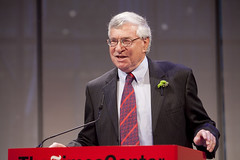Sol Stetin Award-Winner Nelson Lichtenstein's Acceptance Speech

Nelson Lichtenstein
Remarks
Sidney Hillman Foundation
Sol Stetin Award for Labor History
May 1, 2012
I am delighted to receive this award from the Hillman Foundation and quite humbled to stand at the same podium where that great generation of labor history pioneers and teachers – the late David Montgomery, David Brody, and Melvin Dubofsky – once stood.
They made labor history, which had once been the marginal stepchild of business administration and an unwelcome bother to most economists, a central component of what we study in the academy, not just in history, but in English, Sociology, Politics, Law, and Gender Studies. Indeed, it has been somewhat of an embarrassment in my own profession that so many of those who win prizes or get elected to top offices began their careers as students of labor history. And among the new generation of historians that it has been my privilege to mentor, few study the labor movement per se, but in their studies of business, politics, globalization, and capitalism, all are thoroughly grounded in labor history and its distinctive ideological and ethical imperatives. (Of that I make sure, in part through the activities of the Center for the Study of Work, Labor, and Democracy at the University of California, Santa Barbara.)
In truth, there is something different about labor history. Although they are entirely welcome, you don’t find many conservatives, and certainly very few opponents of the labor movement, identifying with the research agenda pursued by most labor historians. And that is because men and women like David Montgomery and James Green and Dorothy Sue Cobble, the latter two also previous Stetin Award winners, have been passionately committed to the labor movement in all its manifest forms. They have been “labor intellectuals” in the best and truest sense of the word.
Indeed, I accept this award in the spirit manifest by one of the great labor intellectuals of his day, a man who was for decades associated with the Amalgamated Clothing Workers of America, the union founded and long led by Sidney Hillman himself. This was Jacob Benjamin Salutsky or J.B. S. Hardman, the editor of the Amalgamated’s newspaper, The Advance, for many years during the first half of the 20th century. Hardman was part of the great generation of exiles from Czarist Russia who helped found the garment trades unions and who never stopped pushing and prodding the entire labor movement to fulfill its humane and socialist destiny. He tutored America’s most influential and radical sociologist, C. Wright Mills, in labor politics, so that when in 1948 Mills published The New Men of Power, America’s Labor Leaders, he dedicated the book to “J.B.S. Hardman, labor intellectual.”
I wish that the leaders of the union movement today could once again be described as “the new men of power.” But regardless of the status of the unions, then or later, Mills knew that the insights, arguments, and empirical research of labor intellectuals like Hardman was essential if unionists were to understand the trajectory of capitalism and fulfill labor’s potential. As Mills then wrote “To have an American labor movement capable of carrying out the program of the left, making allies among the middle class, and moving upstream against the main drift, there must be a rank and file of vigorous workers, a brace of labor intellectuals, and a set of politically alert labor leaders. There must be the power and the intellect.” I accept the Sol Stetin Award in the interests of that alliance.
[Photo credit: Clark Jones.]

